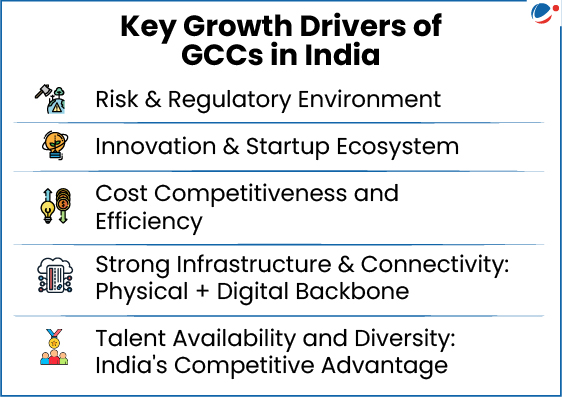The suggested framework provides a structured national vision to support the continued expansion and elevation of India’s GCC ecosystem.
About GCCs

- GCCs are offshore centers established by multinational companies to deliver capabilities such as technology innovation, research and development and service delivery to its parent organization.
- Significance: India has established itself as global hub for GCCs, hosting nearly 50% of all GCCs worldwide, which contributes around 1.8% of national GDP.
- Net employment impact of India’s GCC ecosystem is estimated at ~10.4 million in FY25.
Suggested Framework for National Policy on GCCs
National Policy on GCCs shall be structured around a three-pillar framework –
- Strategic Priorities:
- Growth objectives by 2030: 5,000 GCCs, overall GVA contribution of around $470-600 billion, and employment to 20-25 million people.
- Emerging Opportunity Areas: Quantum Computing, Digital Healthcare, Industry 4.0 etc.
- Critical Success Factors:
- Talent Development: Industry-Academia collaboration, specialized curriculum etc.
- Infrastructure: Development of world class plug and play infrastructure, Digital Economic Zones, data centers, cloud infrastructure etc.
- Locational Capability: Establish innovation hubs, data centers, R&D zones etc. in tier-2/3 cities.
- Performance Levers:
- Policy Instruments: Single window platform for GCC investors, fast-track approvals, tax incentives like tax holidays, export incentives and investment allowances.
- Investment Facilitation: Prioritize traditional markets (US, UK) and underpenetrated regions (Japan, Nordics, Australia etc.), and provide regulatory handholding.
- Governance Framework: Form national GCC Council, dedicated GCC cells, inter-ministerial working groups, and industry advisory panel.




